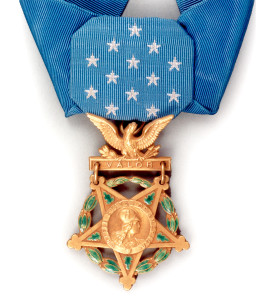LOST TO HISTORY FOR 94 YEARS,
MEDAL OF HONOR RECIPIENT TO BE BURIED
AT MIRAMAR NATIONAL CEMETERY, JULY 9, 2015
 He was forgotten, and his remains went unclaimed for almost a century, but Army Sgt. Charles Schroeter – who was awarded the Congressional Medal of Honor for gallantry in an 1869 battle during the Indian Wars – will finally be buried with full military honors at 9 a.m., Thursday, July 9, 2015, at San Diego’s Miramar National Cemetery. Schroeter will be the first Medal of Honor recipient to be buried at Miramar.
He was forgotten, and his remains went unclaimed for almost a century, but Army Sgt. Charles Schroeter – who was awarded the Congressional Medal of Honor for gallantry in an 1869 battle during the Indian Wars – will finally be buried with full military honors at 9 a.m., Thursday, July 9, 2015, at San Diego’s Miramar National Cemetery. Schroeter will be the first Medal of Honor recipient to be buried at Miramar.
An honor guard of the 11th Armored Cavalry from Fort Irwin, Calif., led by Brig. Gen. Joseph M. Martin, will join the Miramar National Cemetery Support Foundation at the service, scheduled to begin at 9 a.m. in the Memorial Circle.
Veterans, active duty personnel, and the public are invited to attend the historic ceremony. Parking will be on cemetery streets. Miramar National Cemetery is located at 5795 Nobel Dr., between I-805 and Miramar Road.
At the beginning of the ceremony, a horse-drawn hearse – preceded by an Army band and accompanied by an honor guard – will transport an urn with Schroeter’s remains to the cemetery’s Memorial Circle. The urn will be placed in front of the podium, where it will rest throughout the service.
A rifle squad will fire a salute at the conclusion of the ceremony, and a bugler will play “Taps”. The honor guard will conduct a ceremonial flag folding, and will present the flag to the cemetery director, acting as next-of-kin.
Schroeter’s urn then will be transported by the hearse to graveside near Committal Shelter A at the north side of the cemetery. The urn will be buried at the foot of a white marble gravestone marked in gold inscription with Schroeter’s name, service, birth and death dates, and with the Medal of Honor insignia.
Schroeter’s remains were located only recently, when the Congressional Medal of Honor Historical Society traced them to San Diego’s Greenwood Memorial Park, where they had rested since 1921. The remains were interred in an unmarked crypt, along with other unclaimed remains.
Acting on information from the Historical Society, and other sources, the Support Foundation successfully sought approval from the Department of Veterans Affairs to have Schroeter’s remains re-interred at Miramar National Cemetery. The Foundation also notified the Army command at Fort Irwin, which enthusiastically agreed to participate in a burial and honors ceremony.
Born on the Fourth of July
Charles Schroeter was born on the Fourth of July, 1837, a native of Lûneburg, Germany, but a man who would make his mark in United States history. He immigrated to this country in 1860, eventually locating in St. Louis.
In 1863, he joined the 1st Volunteer Missouri Cavalry Regiment and fought in many Civil War battles against Confederate forces in Arkansas. Following the War, Schroeter joined the U.S. 8th Cavalry and, for many years served in the West as a cavalryman and infantryman.
Schroeter was awarded the Congressional Medal of Honor for gallantry during the Battle of Rocky Mesa on Oct. 20, 1869. The battle followed an Apache attack on a stagecoach that left two civilians and four troopers dead.
Then a private, Schroeter and his comrades – under the command of Capt. Reuben Bernard – tracked the Apaches, led by the great Chief Cochise, into the Chiracahua Mountains of southeast Arizona.
Called the Campaign of Rocky Mesa, the battle was fought on a miserably cold and rainy day. The Apaches had the high ground, and the troopers were hard-pressed to survive the rifle fire that rained down on them from above. Two men were killed and one wounded before darkness brought an end to the fighting.
Schroeter also served five years in the Marine Corps, mostly aboard a Navy ship in the Mediterranean. In total, he gave 30 years, seven months of military service to his adopted country.
Life in Retirement
After retirement, Schroeter and a partner – Edwin Hoopes – opened a confectionary and tobacco store in Buffalo, N.Y. The old soldier never married and had no immediate family, so he lived with the Hoopes family. Edwin Hoopes died in 1913, but Schroeter continued to live with Hoopes’ son, Charles. In 1918, Charles and his family – and Schroeter – relocated to San Diego, where they lived in a house on Jackdaw Street in Mission Hills.
Sgt. Charles Schroeter died on Jan. 27, 1921. San Diego Masonic Lodge 35 conducted a memorial service. His remains were cremated at Greenwood Cemetery. There was no funeral, and the remains were never claimed.
“Charles Schroeter fought in fierce battles to preserve the Union, and to free an enslaved people,” said Dennis A. Schoville, President & CEO of the Support Foundation. “He fought to protect Americans as they moved west across a vast and hostile continent. He was among the bravest of men and, during 30 years of military service, remained devoted to his adopted country. Charles Schroeter was a true American hero, and patriot, who deserves to finally rest with honor.”
